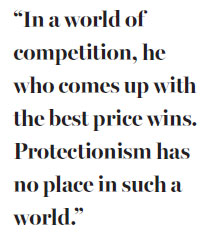Steel and politics make for a bad mix
The claims and counterclaims are flying, but the issue is not as black and white as some may suggest
Look at an issue, any issue, and the truth often lies midway between two arguments. The current imbroglio involving the world steel trade is a perfect case in point.
On the one hand, you have European and United States steel producers, hit by a slumping world market for steel products; and on the other, you have China, with its vast industrial resources able to churn out steel products at highly competitive prices.
If there was a high demand for steel, China's output and that of the European steel industry could exist side by side, as it has in the past. But a slump in demand has triggered an immediate knee-jerk reaction, mainly from European and US trade unions and manufacturers, that Chinese overproduction and dumping of steel at cutthroat prices on world markets is to blame.
But it's not as clear-cut as that. What's difficult is cutting through the blizzard of data, claim and counterclaim. But key facts do emerge.
The US, known for its ability to jump behind the shield of protectionism at the earliest opportunity, has reacted by imposing a 552 percent increase in tax on some categories of imported Chinese steel products, although the items affected constitute a very low percentage of US steel imports; thus the move is more political than real.
The European Union, which has major steel industries in France, Germany, Belgium and Britain, was quick to blame Chinese overproduction, with European Commission President Jean-Claude Juncker warning of fresh trade duties on Chinese steel imports.

Tata Steel, the Indian conglomerate that has put much of its British operations up for sale, blames Chinese dumping for the industry's problems, as do the unions.
Britain, which is actively helping Tata find a buyer for its plants, is not keen to follow the EU hard line, warning that tougher tariffs will only push prices higher and harm other industries that rely on steel.
China has already cut production from its largely state-backed steel industry. Wuhan Iron and Steel plans to cut its employees to about 30,000.
Britain can point to success, saying a 99 percent drop in imports of rebar steel products used in the construction industry in January showed that only a mild increase in import tariffs can work.
But the data keeps on coming. China, where 3 million workers are employed in the steel industry, exported 9.98 million metric tons of steel in March, a 23 percent rise on the previous month.
It's believed that China makes up half of the world's steelmaking industry.
Here's an idea of what the Chinese government is having to wrestle with - domestic demand has slumped, so the government is having to try and help producers find overseas markets.
In Europe, when a worker loses his job or gets laid off, the countries all have social support networks that offer unemployment pay and a range of other benefits.
China, which is still developing, can't yet offer that safety net for its workers. And when you consider that millions of other jobs in the supply chain in China depend on the steel industry, things don't look so black and white.
Steel plant closures in China would have a massive social and financial impact in the regions housing the industry, especially given the sheer numbers involved.
The world has for years been urging China to open up its markets. In the last 20 years, China has done so with a dramatic effect. It makes its steel cheaply, and sells it on the open market. People buy it.
In a world of competition, he who comes up with the best price wins. Protectionism has no place in such a world.
It may be as well for European and US trade negotiators to remember the pressures that China faces, too.
The author is managing editor of China Daily European Weekly, based in London. Contact the writer at chris@mail.chinadailyuk.com
























